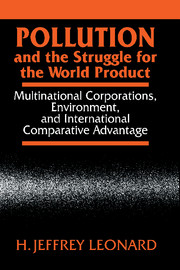 Pollution and the Struggle for the World Product
Pollution and the Struggle for the World Product Book contents
- Frontmatter
- Contents
- List of tables
- Preface
- Introduction
- 1 The dynamics of international trade and industrial location
- 2 Industrial-development strategy and the role of multinational corporations
- 3 Pollution and comparative advantage in industrial production
- 4 Environmental regulations and the industrial-flight hypothesis
- 5 Pollution and industrial strategy in four rapidly industrializing countries
- 6 Bargaining for the right to pollute
- 7 The politics of pollution and multinational corporations in rapidly industrializing countries
- 8 Theoretical implications and policy recommendations
- Index
6 - Bargaining for the right to pollute
Published online by Cambridge University Press: 05 January 2012
- Frontmatter
- Contents
- List of tables
- Preface
- Introduction
- 1 The dynamics of international trade and industrial location
- 2 Industrial-development strategy and the role of multinational corporations
- 3 Pollution and comparative advantage in industrial production
- 4 Environmental regulations and the industrial-flight hypothesis
- 5 Pollution and industrial strategy in four rapidly industrializing countries
- 6 Bargaining for the right to pollute
- 7 The politics of pollution and multinational corporations in rapidly industrializing countries
- 8 Theoretical implications and policy recommendations
- Index
Summary
Political scientists and economists have focused a great deal of attention in recent years on the nature of the bargaining relationship between multinational corporations in search of a hospitable country for a new production facility and nation-states depending on foreign businesses for the economic benefits they generate. Often, companies play different countries off against each other to extract maximum concessions, offering their technological, capital, and managerial resources and their job-creating potential in return. Countries more and more often attempt to conduct negotiations with a number of companies from a variety of countries to increase their bargaining strength.
Still, as noted in Chapter 2, most studies of the bargaining relationship between countries and companies conclude that in the initial phase, before a company actually builds a plant in one or another country, the upper hand generally belongs to the corporation. Indeed, there has been sharp criticism of the process wherein many large multinational corporations make little secret of jurisdiction shopping, eliciting large monetary concessions from governments desperate for jobs and foreign-exchange revenues. The process is hardly confined to poor countries in need of rapid industrial development; it has reached its apogee in Europe, where large companies now tender proposals to several countries and wait to see which government bids the most. In 1979, for example, Ford finally agreed to build a new European car plant in Austria, after soliciting simultaneous offers from Spain, Belgium, Britain, France, and West Germany.
- Type
- Chapter
- Information
- Pollution and the Struggle for the World ProductMultinational Corporations, Environment, and International Comparative Advantage, pp. 156 - 190Publisher: Cambridge University PressPrint publication year: 1988


